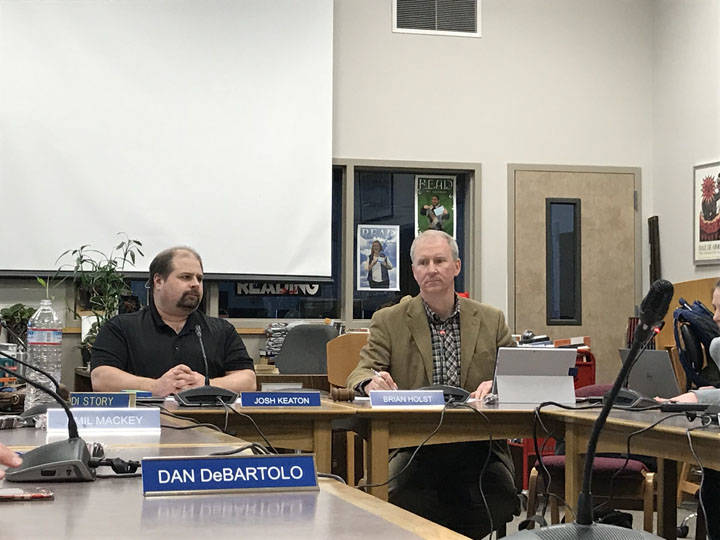Juneau’s school district budget will start the 2019 school year with $3.5 million less than last year after the Board of Education approved the Fiscal Year 2019 budget during a special meeting at Juneau-Douglas High School Tuesday.
After four hours of debate and discussion, the board voted 6-1 to approve the budget. Board member Andi Story had the one dissenting vote.
“There is nothing good about making $3 million in cuts,” Board President Brian Holst said. “We still feel students will get the adequate education they need.”
Total cuts to the budget accumulate to more than $3.5 million, largely due to lack of funding from the state, which is facing a multibillion dollar deficit. These cuts did not come without a lengthy discussion between board members and faculty.
One of the major issues was the proposed cut of $500,000 from the special education department — which stands at nearly $16 million.
Dr. Bridget Weiss, Director of Student Services, explained that faculty cuts and possible other changes would need to be made if the special education program sees cuts. One point she presented is that there is a higher-than-normal number of special needs students at the district. Therefore, more money is allocated. According to the U.S. Department of Education, 13.4 percent of students are identified as children with disabilities in Alaska. The Juneau School District’s number is at 18 percent according to the district’s website. The school district is considered a magnet school — a public school offering special instruction and programs not available elsewhere, designed to attract a more diverse student body from throughout a school district.
“We do not have time or a mechanism to determine if we are a magnet school,” Weiss said. “What we do know is that our number (of special education students) is increasing.”
There has been a 1 percent increase from the 2016-17 school to the current numbers in the district, according to 2017 demographics chart.
Weiss added that it is hard to predict how much money is spent year-to-year because different expenditures can happen.
“Maybe a behavior specialist will be needed,” she said. “Or there is leave payoff when a teacher separates from the district.”
Holst, along with other board members, were concerned a cut to the department could hurt the the Maintenance of Effort (MOE), which refers to a requirement school districts demonstrate that the level of state and local funding remains constant from year to year.
JSD Superintendent Mark Miller said MOE is not an issue right now and a special education student who may need funding will get it. Miller gave an example of student who may need to get a specialist that would cost the district additional funds. However, there is the possibility that making “real-time” financial decisions could put the district in a negative fund balance.
“We might be able to find saving somewhere else that is being under spent,” Miller said.
The board voted 4-3 to not have the $500,000 cut made to the department. However, an amendment to the budget will add $160,000 to the general instructional program that reduces the special education department budget by that amount. This amount may be used towards at a full-time equivalency teacher at the elementary school.
Story, who proposed adding AVID (Advancement Via Individual Determination) — a college readiness program that places special emphasis on growing writing, critical thinking, teamwork, organization and reading skills — to middle school at a cost of $39,644 said she though more academic programs needed to be added to the budget. AVID was not approved for the final budget.
“These programs need funding in full,” Story said. “They really make a difference for kids.”
Some other factors that could impact the budget going forward are the assumptions that the City and Borough of Juneau will help with funding and base state allocations will be $6,030 per student — a $100 increase from last year. State funding is uncertain and if the allocations do change, the budget will need to be revisited.
The total proposed budget for FY 2019 is $70,914,77. Just three years ago, the FY 2016 was about $85.6 million. The budget has been cut each following year: FY 2017’s budget was $83.6 million and FY 2018 was $72 million.
The district will now need to forward the budget to the CBJ. The district is asking for more than $27 million from the city, which is about $1 million more than last year. If the Assembly does not approve the budget, it will need to be revisited by the board.
“We now have to present the budget to the Assembly and work with them,” Holst said. “We are asking for more money than we ever have. Maybe they will go all the way up to the amount we are asking. That is the discussion that we have to have with them and tell them why we are asking for that.”
• Contact reporter Gregory Philson at gphilson@juneauempire.com or call at 523-2265. Follow him on Twitter at @GTPhilson.

